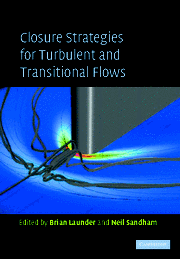25 - Is LES Ready for Complex Flows?
Published online by Cambridge University Press: 06 July 2010
Summary
Abstract
Recent developments in LES modelling, combined with further advances in capabilities of computers and numerical methods, provide a strong incentive to apply LES to complex flows. This brings to focus a number of issues in the development of LES that are not yet fully resolved. These include modelling and numerical elements, their respective errors, and the potential for interaction between these two sources of error. We discuss the relative importance of some of the errors that can arise in simple as well as complex flows and give global criteria and guidelines that can be helpful in order to arrive at a form of LES that is robust and accurate.
Introduction
The intricate nature of high Reynolds number turbulent flow has to date defied detailed rigorous or direct numerical analysis and, consequently, has given rise to a number of modelling strategies. Such strategies are aimed at reducing the complexity of the underlying system of equations while retaining sufficient information to reliably predict the flow phenomena of interest in an application. These two conflicting requirements are prominent in large-eddy simulation.
In recent years there has been a significant interest and associated development in large-eddy simulation (LES) which raises the question whether the LES approach can already be applied to flows of engineering interest and consequently move away from academic problems. To address this question objectively in this generality is quite difficult. Instead, we will focus on some outstanding open problems that need to be confronted in order to develop LES, in particular for complex flows. While there has undeniably been considerable progress in LES concerning modelling and numerical issues which has resulted in a number of large-scale complex flow predictions by a large number of different research groups using LES, the significance of some of the not yet resolved problems suggests that both a ‘yes’ and a ‘no’ answer are still possible for the question raised. In particular, as we discuss below, the answer strongly depends on the type of information one wants to predict.
One can choose between the ‘implicit’ and the ‘explicit’ filtering approach to LES (Ghosal 1999). We adopt here the explicit filtering approach because it is more amenable to analysis and allows for a separation of issues related to modelling and numerical treatment. In this approach a spatial filter is applied to the Navier–Stokes equations.
- Type
- Chapter
- Information
- Closure Strategies for Turbulent and Transitional Flows , pp. 720 - 739Publisher: Cambridge University PressPrint publication year: 2002
- 1
- Cited by



